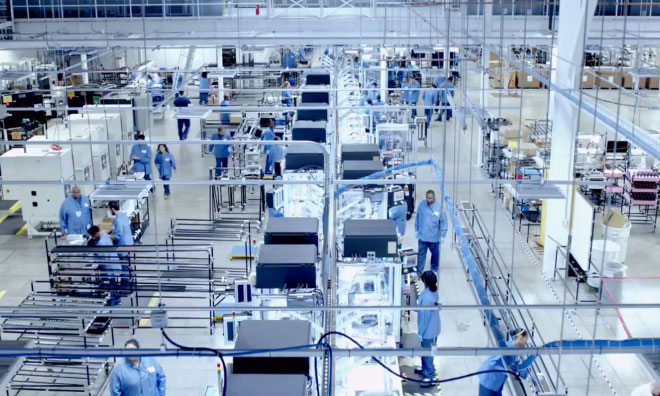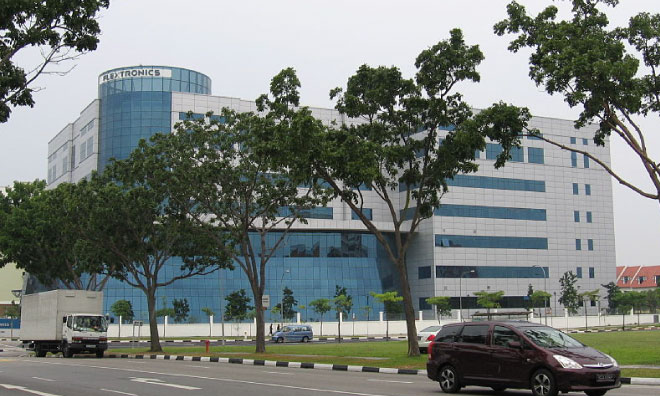Singapore-based contract manufacturer Flextronics is alleged to have flouted Apple supplier guidelines when hiring workers in the weeks before the iPhone 5's release, using recruiters throughout southeast Asia who "sold" the jobs to migrant workers for hundreds of dollars and confiscated their passports, then leaving the workers without pay or food for months.
Flextronics's Austin facility that will produce the new Mac Pro | Source: Apple
Forcing migrant workers to pay fees to secure a job in another country is a standard operating practice in Asia, but a Thursday report from Businessweek alleges that Flextronics — Â which is also a supplier to Lockheed Martin and Ford, among others — allowed recruiters bringing in workers to build iPhone 5 camera modules to charge more than half a year's salary — far more than is allowed by Apple.
The report cites the case of a Nepalese man who paid approximately $1,000 to three separate recruiters to land a job as a camera module tester at a Flextronics facility in Malaysia, a position that brought a salary of around $180 per month. Apple guidelines set the maximum recruiting fee at one month's net salary, requiring suppliers to refund any excess fees directly to the employee, a policy which Flextronics is alleged to have ignored.
According to the Businessweek report, Apple pulled orders from the Malaysia factory after yield rates dropped to as low as 30 percent, forcing the supplier to lay off its more than 3,000 employees. Though Flextronics did provide full pay and severance, they allegedly did not follow through on promises of repatriation, instead holding the passports of more than 1,300 workers who then had no choice but to remain in a Flextronics-provided hostel with little funds —  and in many cases, no food —  for up to two months after the facility was shuttered.
Only when Malaysian police became involved did Flextronics begin providing meals and resumed sending workers home, according to the report. Once back in their native countries, however, the workers still faced the prospect of repaying loans taken out to cover the recruiters' fees — most are still working to retire the debt with new jobs which pay as little as $90 per month, while others were forced to sell off much-needed land to satisfy the creditors.
For its part, Flextronics told the publication that it had already begun investigating the allegations and would "immediately reimburse any employees that have been charged excessive fees by labor agencies," according to a spokeswoman. The charges come at a time when Flextronics is preparing for a larger role in Apple's supply chain, as the company is set to begin manufacturing the new Mac Pro in an Austin, Texas facility.
Apple said it would ensure "the right payments have been made," and spokesman Chris Gaither noted the company has helped workers recover more than $16 million in such payments since 2008.
"We aggressively investigate any claims of bonded labor where Apple products are made," Gaither said, adding that the company "is continuously auditing deeper into the supply chain" and takes "these allegations extremely seriously."
As Apple's popularity has skyrocketed over the last few years, the company has frequently been lampooned by the media when labor issues arise at contract manufacturers with which the company has a relationship. In response, Apple has initiated a wide-ranging supplier responsibility program, and in 2012 became the first technology company to join the Fair Labor Association, a trade group that independently assesses and reports on factory conditions.
 Shane Cole
Shane Cole








-m.jpg)






 Christine McKee
Christine McKee
 Marko Zivkovic
Marko Zivkovic
 Mike Wuerthele
Mike Wuerthele

 Amber Neely
Amber Neely
 Sponsored Content
Sponsored Content
 Wesley Hilliard
Wesley Hilliard










31 Comments
As Apple’s popularity has skyrocketed over the last few years, the company has frequently been lampooned by the media when labor issues arise at contract manufacturers with which the company has a relationship...” Ya think? Of course this will be presented to the world as an Apple only problem. The fact that other large companies do business with Flextronics will be ignored. I can’t wait to see the headline on c|net, followed by the usual hypocritical trolling. Ooops, it’s already out there. http://origin-www.businessweek.com/articles/2013-11-07/an-iphone-tester-caught-in-apples-supply-chain#p1
This is the link to the original story... http://mobile.businessweek.com/articles/2013-11-07/an-iphone-tester-caught-in-apples-supply-chain?campaign_id=yhoo Here is my response emailed to Business Week... I read this article in its entirety this morning. I was affected by the story more than expected. I attributed the emotion to the fact I was reading it on my iPhone 5. Half way through I wondered about the supply chain activities of other leading US companies like Amazon and Google. I questioned myself to find out if I was attempting to deflect attention away from Apple by placing the focus on other companies. The answers were yes and no. I really did want to know about the supply chain conditions of the other US companies producing smartphones and tablets just as Apple was doing. I continued reading the article and understood the downward financial spiral Dhong and others were in and would be unable to easily escape as they attempted to provide a better life for their families and themselves. At the end if the article I was awed. The birth of the iPhone 5 I am so proud of was not pristine. The collateral damage created from just the iPhone 5's camera boggled my mind. I wondered about the long-term damages that will be felt by Dhong from the iPhone 5 as I move forward with the iPhone 5s and future iPhones. This thinking brought me back to Amazon and Google. These two companies had new smartphones and tablets on the market near the time Apple had its smartphones and tablets. I wondered if these companies had similar supply chain exploitations being experienced by people like Dhong. And, if so, why was it I had not read anything about it in Businessweek, New York Times, Wall Street Journal, Washington Post, USA Today, Fortune, Forbes and other publications during 2011, 2012 and 2013. Apple's supply chain cannot be the only supply chain that is so terrible and qualifies to be brought to the world's attention. The decimation of human lives cannot be an Apple-only experience. It just cannot be.
Apple's supply chain cannot be the only supply chain that is so terrible and qualifies to be brought to the world's attention. The decimation of human lives cannot be an Apple-only experience. It just cannot be.
Apple is the most popular company on the planet right now. Anything negative about Apple garners attention. Activists know this (Greenpeace, etc.), talking heads and pundits know this, financial manipulators know this. When you’re the top dog you have a bullseye painted on your back. It does no good to question why Apple is singled out. We should know why by now.
What has the MacPro production facility in Austin, TX to do with indentured servitude? Is AI trying to suggest that similar practices will occur there, given the Flextronics ownership?
Apple is the most popular company on the planet right now. Anything negative about Apple garners attention. Activists know this (Greenpeace, etc.), talking heads and pundits know this, financial manipulators know this. When you’re the top dog you have a bullseye painted on your back. It does no good to question why Apple is singled out. We should know why by now.
Agreed. And Apple has reacted to lesser issues in the past, so pointing this out and getting apple to react drives all other companies into the 'we could be next' spotlight.
Singapore is one of those countries that tacitly supports big business and may in fact be involved in this at some level. I've had very good friends go into countries and have their passports confiscated for their work duration by gov't contractors fronting the regime (Looking at you DUBAI!, NIGERIA!). I've learned from them it's now a semi-standard operating procedure for IT consultants to go to a intermediary country and get a 'ghost' passport from that country, and use that for port of entry into work environments, smuggling their US (or another non US ghost) passport in just in case the ghost is confiscated [note, often it's confiscated at the Hotel not directly by the contractor as proof of your credit card, then 'held' to 'insure payment'], and you need to exit prior to contract completion.